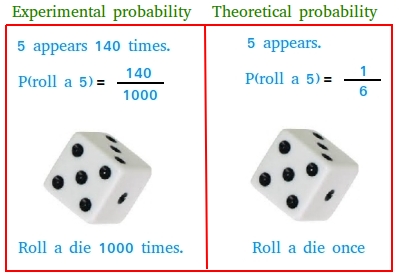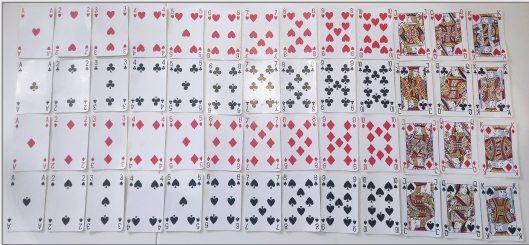Theoretical Probability
The theoretical probability is found whenever you make use of a formula to find the probability of an event. Unlike experimental probability, there is no need to perform an actual experiment.
To find the probability of an event, also called likelihood of an event, use the formula below:
The number of favorable outcomes is the likelihood to get a specific outcome.
What about the number of possible outcomes? Suppose you throw a die numbered from 1 to 6.
Count all the possible numbers you can get. This is called number of possible outcomes.
All the possible numbers are 1, 2, 3, 4, 5, and 6. Thus the number of possible outcomes is 6.
You could make up different types of favorable outcomes.
You could say...
a. Likelihood to get an even number.
b. Likelihood to get a prime number.
c. Likelihood to get an odd number.
d. Likelihood to get a 4.
e. Likelihood to get a 1.
f. Likelihood to get a number bigger than 4.
g. Likelihood to get a number less than 6.
All the above are examples of favorable outcomes.
A couple of examples showing how to find the theoretical probability.

Exercise #1
Throw a die once. What is the probability of getting a number less than 6?
Ask yourself, "How many number are less than 6?"
Since there are 5 numbers less than 6, the number of favorable outcomes is 5.
Since the die had a total of 6 numbers, the number of possible outcomes is 6.
Probability of getting a number less than 6 = 0.8333.
Probability of getting a number less than 6 = 83.33%
This means that it is very likely you will get a number less than 6.
Exercise #2
A bag contains 6 blue balls, 4 yellow balls, and 2 red balls.
What is the theoretical probability of getting a yellow ball?
Since you have 4 yellow balls playing on your favor, the number of favorable outcomes is 4.
To get the total number of possible outcomes, just count all the balls. Total number of possible outcomes is 12.
Probability of getting a yellow ball = 0.3333
Probability of getting a yellow ball = 33.33%
Exercise #3
Suppose you toss a coin twice. What is the theoretical probability to get at least 1 head?
Since you tossed the coin twice, you could end with the following outcomes
HH
HT
TH
TT
There are three cases where the number of heads is at least 1 head: HT, TH, HH
Total number of possible outcomes: HH, HT, TH, TT
Probability of getting at least 1 head = 0.75
Probability of getting at least 1 head = 75%
Exercise #4
A bag contains 10 blue marbles, 10 yellow marbles, and 10 red marbles.
What is the theoretical probability of getting a blue marble or a yellow marble?
Let A be the number of blue marbles and B the number of yellow marbles.
P(A or B) = P(A) + P(B)
P(A) = 10/30 = 1/3
P(A) = 10/30 = 1/3
P(A or B) = 1/3 + 1/3
P(A or B) = 2/3
P(A or B) = 0.6666
P(A or B) =66.66%
Exercise #5
A card is drawn from a deck of cards. What is the probability of drawing an ace from the deck?

A deck of 52 cards has 4 aces. Therefore, the number of favorable outcomes is 4 and the number of total outcomes is 52. The probability to get an ace is 4/52 = 1/13